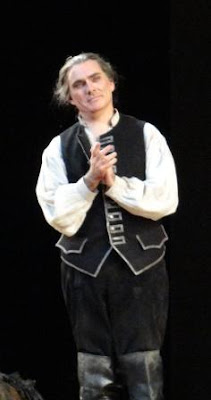(review in english
below)
O jovem soprano chinês Guanqun
Yu, vencedora em 2012 do concurso Operália promovido por Plácido Domingo, foi uma Leonora excelente. Tem voz potente, bonita e afinada. Talvez ainda
ligeiramente dura no registo mais agudo. Mas foi muito credível na personagem.
Reagiu com grande emotividade aos aplausos (que foram muitos e frequentes), o
que a desconcentrou um pouco quando teve que voltar a cantar. Mas, no computo
final, muito bem.
Os papeis secundários foram cumpridos pelo baixo Morris Robinson como Ferrando (com um
registo médio menos eficaz), o soprano Maria
Zifchak como Inez (também nem sempre segura) e o tenor Hugo Vera como Ruiz.
****
IL
TROVATORE, METropolitan OPERA, October 10/18/2012
Il Trovatore is one of the best known operas by G. Verdi, with libretto by Salvadore Cammarano and Leone Emanuele Bardare, which requires high quality singers to be sung convincingly. The plot can be read here.
I had also seen this production at the Met last season and, as with Carmen that I saw the day before, this performance included singers unknown to me, with the exception of Dolora Zaijick.
I do not like the staging by David McVicar because it is a bit ambiguous. It uses a rotating stage but the effect is weaker than expected. Narrow stairs placed throughout the wall height that rotates, cause difficulties to the singers who are in less stable equilibrium. The different scenes occur in identical locations and, at the background, there is a Christ on the cross and some hanged men, without bringing any significant added value to the staging.
Il Trovatore is one of the best known operas by G. Verdi, with libretto by Salvadore Cammarano and Leone Emanuele Bardare, which requires high quality singers to be sung convincingly. The plot can be read here.
I had also seen this production at the Met last season and, as with Carmen that I saw the day before, this performance included singers unknown to me, with the exception of Dolora Zaijick.
I do not like the staging by David McVicar because it is a bit ambiguous. It uses a rotating stage but the effect is weaker than expected. Narrow stairs placed throughout the wall height that rotates, cause difficulties to the singers who are in less stable equilibrium. The different scenes occur in identical locations and, at the background, there is a Christ on the cross and some hanged men, without bringing any significant added value to the staging.
The Italian
conductor Daniele Callegari was responsible
for a clumsy direction, with numerous instrumental displacements, as well as
with the singers. The Orchestra and the Chorus
of the Met should have already interpreted this opera hundreds of times but I
think in a few, the mistakes were so many.
As for the soloists, the differences were remarkable, and the ladies took the best!
The young Chinese soprano Guanqun Yu, the winner of the Operália contest in 2012 promoted by Placido Domingo, was an excellent Leonora. She has a powerful, beautiful and refined voice. Perhaps still a little stiff on the higher range. But her character was very credible. She racted with great emotion to the applauses (which were many and came often), what mignt have distracted her a bit when she had to sing again. But overall she was very good.
As for the soloists, the differences were remarkable, and the ladies took the best!
The young Chinese soprano Guanqun Yu, the winner of the Operália contest in 2012 promoted by Placido Domingo, was an excellent Leonora. She has a powerful, beautiful and refined voice. Perhaps still a little stiff on the higher range. But her character was very credible. She racted with great emotion to the applauses (which were many and came often), what mignt have distracted her a bit when she had to sing again. But overall she was very good.
The same I
can not say of Welsh tenor Gwyn Hughes
Jones who sang Manrico. He has a small voice, the timbre is not ugly, but
he was monotonous throughout the recitation and, and in the top notes, even
very “squeezed”, it was noticeable loss of voical quality. In the famous aria Di quella pira his final words were hardly heard (but that
did not prevent him of receiving a big applause) For me, he has no quality enough
to sing this role in a theater like the Met.
The Count
di Luna was interpreted by Spanish baritone Àngel Òdena. He is a singer with a respectable voice, able to express
interesting variations according to what he sings. He could be always listened throughout
the performance but his artistry was a fatal in one aspect – he did not take
off his the eyes from the conductor, which resulted in a poor acting on stage,
because he did not face the other singers he was playing with. It seemed that
he had not rehearsed. A pity.
Dolora Zajick, despite having a viral infection (we were
informed immediately before the performance), has established herself as the
best singer of the night and one of the best running interpreters of Azucena. She
was breathtaking! Her voice is powerful and of great beauty, with a low record capable
of vibrating the floor, but she is also optimal in all other registers. Apart
from singing, she also played the role which positively differentiated her from
her peers on stage. Astonishing!
The
secondary roles were fulfilled by bass Morris
Robinson as Ferrando (with a medium register less effective), soprano Maria Zifchak as Inez (also not always
secure) and tenor Hugo Vera as Ruiz.
It was an Il Trovatore in which only the ladies shone.
****
It was an Il Trovatore in which only the ladies shone.
****





















As usual,
ResponderEliminara perfect "objective" recense!
"Warm" greetings from Gent (-2°Celsius)
Willy